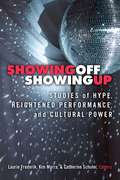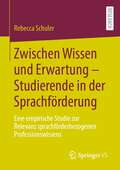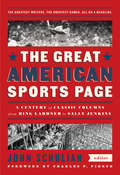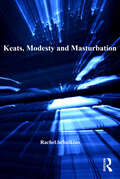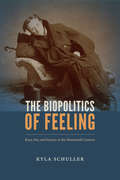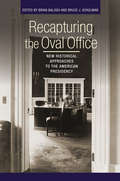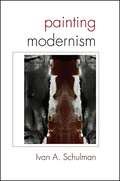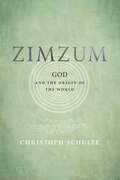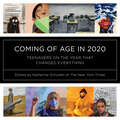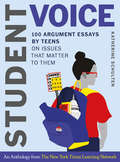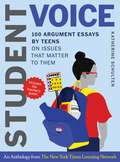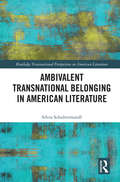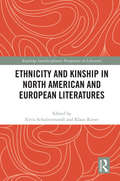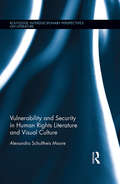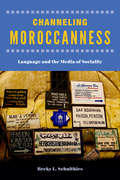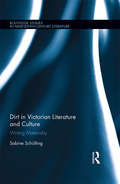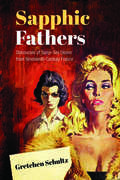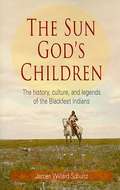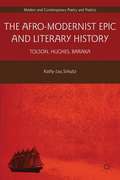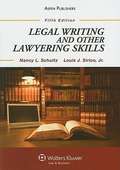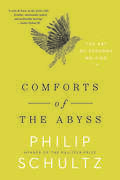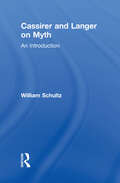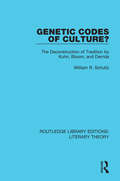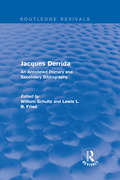- Table View
- List View
Romanticism and Pragmatism
by Ulf SchulenbergThis interdisciplinary project is situated at the boundary between literary studies and philosophy. Its chief focus is on American Romanticism and it examines work by a number of prominent writers and philosophers, from Whitman and Thoreau to Barthes and Rorty.
Showing Off, Showing Up: Studies of Hype, Heightened Performance, and Cultural Power
by Catherine A. Schuler Kimberley Bell Marra Laurie FrederikThe interdisciplinary essays in Showing Off, Showing Up examine acts of showing, a particular species of performance that relies on competition and judgment, active spectatorship, embodied excess, and exposure of core values and hidden truths. Acts of showing highlight those dimensions of performance that can most manipulate spectators and consumers, often through over-the-top heightening and skewing of presentation. Many forms of showing and of heightened performance, however, operate more enigmatically and covertly while still profoundly affecting the social world, even if our reactions to them are initially flippant or unconcerned because “it’s just a show.” Examining a wide range of examples—from dog shows to competitive dancing to carnivals to striptease, the essays illuminate how such events variously foster competition, exaggerate a characteristic, and reveal hidden truths. There is as much to be learned about the power of showing through subtlety and underlying intentionality as through overt display. The book’s theoretical introduction and 12 essays by leading scholars reveal how diverse, particularly efficacious genres of showing are theoretically connected and why they merit more concerted attention, especially in the 21st century.
Zwischen Wissen und Erwartung – Studierende in der Sprachförderung: Eine empirische Studie zur Relevanz sprachförderbezogenen Professionswissens
by Rebecca SchulerIn universitären Sprachförderprojekten sind Lehramtsstudierende zugleich Lernende und Sprachförderpersonen. Mit dieser doppelten Zuschreibung sind zwei Sozialisationsinstanzen – Universität und Schule – verbunden und spezifische Auswirkungen auf das sprachförderbezogene Professionswissen verknüpft. Vor diesem Hintergrund wird in der vorliegenden Studie, die empirische Erkenntnisse einer theoretischen Modellierung gegenüberstellt, untersucht, über welche sprachförderbezogenen Professionswissensbestände in der Sprachförderung tätige Lehramtsstudierende verfügen. Neben der Relevanz von Perspektivierung und Gegenstandsspezifizierung wird deutlich, dass sowohl ein weiter Wissensbegriff als auch die verschiedenen Rollen der Studierenden in Praxisprojekten zu berücksichtigen sind.
The Great American Sports Page: A Library of America Special Publication
by John Schulian Charles P. PierceA first-of-its-kind celebration of the newspaper scribes who made sportswriting a glorious popular art, and immortalized America's greatest games and athletesSpanning nearly a century, The Great American Sports Page presents essential columns from more than three dozen masters of the press-box craft. These unforgettable dispatches from World Series, Super Bowls, and title bouts for the ages were written on deadline with passion, spontaneity, humor, and a gift for the memorable phrase. Read avidly day in and day out by a sports-mad public, these columnists became journalistic celebrities in their home cities, their coverage trusted and savored, their opinions hotly debated. Some even helped change the games they wrote about. Gathered here in a groundbreaking anthology, their writings capture some of sport's most enduring moments and many of its all-time greats: Babe Ruth, Jackie Robinson, Muhammad Ali, and Michael Jordan among them. But the best American sportswriters also found ways to write powerfully about lesser-known athletes and to convey, often with heartbreaking honesty and insight, the less glamorous and more tragic facets of the games we love. In its survey of the finest American sportswriting from Ring Lardner to Thomas Boswell, from Red Smith and Jimmy Cannon to Bob Ryan and Michael Wilbon, The Great American Sports Page takes the measure of the human richness, complexity, and competitive spirit of sports and the athletes who continue to fascinate and inspire us.
Keats, Modesty and Masturbation
by Rachel SchulkinsExamining John Keats’s reworking of the romance genre, Rachel Schulkins argues that he is responding to and critiquing the ideals of feminine modesty and asexual femininity advocated in the early nineteenth century. Through close readings of Isabella; or the Pot of Basil, The Eve of St. Agnes, Lamia and ’La Belle Dame sans Merci,’ Schulkins offers a re-evaluation of Keats and his poetry designed to demonstrate that Keats’s sexual imagery counters conservative morality by encoding taboo desires and the pleasures of masturbation. In so doing, Keats presents a version of female sexuality that undermines the conventional notion of the asexual female. Schulkins engages with feminist criticism that largely views Keats as a misogynist poet who is threatened by the female’s overwhelming sexual and creative presence. Such criticism, Schulkins shows, tends towards a problematic identification between poet and protagonist, with the text seen as a direct rendering of authorial ideology. Such an interpretation neither distinguishes between author, protagonist, text, social norms and cultural history nor recognises the socio-sexual and political undertones embedded in Keats’s rendering of the female. Ultimately, Schulkins’s book reveals how Keats’s sexual politics and his refutation of the asexual female model fed the design, plot and vocabulary of his romances.
The Biopolitics of Feeling: Race, Sex, and Science in the Nineteenth Century
by Kyla SchullerIn The Biopolitics of Feeling Kyla Schuller unearths the forgotten, multiethnic sciences of impressibility—the capacity to be transformed by one's environment and experiences—to uncover how biopower developed in the United States. Schuller challenges prevalent interpretations of biopower and literary cultures to reveal how biopower emerged within the discourses and practices of sentimentalism. Through analyses of evolutionary theories, gynecological sciences, abolitionist poetry and other literary texts, feminist tracts, child welfare reforms, and black uplift movements, Schuller excavates a vast apparatus that regulated the capacity of sensory and emotional feeling in an attempt to shape the evolution of the national population. Her historical and theoretical work exposes the overlooked role of sex difference in population management and the optimization of life, illuminating how models of binary sex function as one of the key mechanisms of racializing power. Schuller thereby overturns long-accepted frameworks of the nature of race and sex difference, offers key corrective insights to modern debates surrounding the equation of racism with determinism and the liberatory potential of ideas about the plasticity of the body, and reframes contemporary notions of sentiment, affect, sexuality, evolution, and heredity.
Recapturing the Oval Office: New Historical Approaches to the American Presidency
by Bruce J. Schulman Brian BaloghSeveral generations of historians figuratively abandoned the Oval Office as the bastion of out-of-fashion stories of great men. And now, decades later, the historical analysis of the American presidency remains on the outskirts of historical scholarship, even as policy and political history have rebounded within the academy. In Recapturing the Oval Office, leading historians and social scientists forge an agenda for returning the study of the presidency to the mainstream practice of history and they chart how the study of the presidency can be integrated into historical narratives that combine rich analyses of political, social, and cultural history. The authors demonstrate how "bringing the presidency back in" can deepen understanding of crucial questions regarding race relations, religion, and political economy. The contributors illuminate the conditions that have both empowered and limited past presidents, and thus show how social, cultural, and political contexts matter. By making the history of the presidency a serious part of the scholarly agenda in the future, historians have the opportunity to influence debates about the proper role of the president today. Contributors: Brian Balogh, University of Virginia; Michael A. Bernstein, Tulane University; Kathryn Cramer Brownell, Purdue University; N. D. B. Connolly, The Johns Hopkins University; Frank Costigliola, University of Connecticut; Gareth Davies, University of Oxford; Darren Dochuk, Washington University; Susan J. Douglas, University of Michigan; Daniel J. Galvin, Northwestern University; William I. Hitchcock, University of Virginia; Cathie Jo Martin, Boston University; Alice O'Connor, University of California, Santa Barbara; Bruce J. Schulman, Boston University; Robert O. Self, Brown University; Stephen Skowronek, Yale University
Painting Modernism (SUNY series in Latin American and Iberian Thought and Culture)
by Ivan A. SchulmanPainting Modernism demonstrates the influence of painting and sculpture on the work of the major writers of Latin American modernism. Through his analysis, Ivan A. Schulman, a foundational figure in the field, offers a concise and new interpretation of works by José Asunción Silva, Julián del Casal, Rubén Darío, José Juan Tablada, and José Martí. Traditional critical discourse on modernism has emphasized the nature of this movement in terms of its self-referentiality, fragmentation, elitist/escapist concepts, and subjective notions of cultural and aesthetic authenticity. Schulman breaks from this approach and examines these works as products of subjectively generated social/artistic practices that are inseparable from socioeconomic transformations and the chaotic cultural crises of the modern world.
Zimzum: God and the Origin of the World (Jewish Culture and Contexts)
by Christoph SchulteThe Hebrew word zimzum originally means “contraction,” “withdrawal,” “retreat,” “limitation,” and “concentration.” In Kabbalah, zimzum is a term for God’s self-limitation, done before creating the world to create the world. Jewish mystic Isaac Luria coined this term in Galilee in the sixteenth century, positing that the God who was “Ein-Sof,” unlimited and omnipresent before creation, must concentrate himself in the zimzum and withdraw in order to make room for the creation of the world in God’s own center. At the same time, God also limits his infinite omnipotence to allow the finite world to arise. Without the zimzum there is no creation, making zimzum one of the basic concepts of Judaism.The Lurianic doctrine of the zimzum has been considered an intellectual showpiece of the Kabbalah and of Jewish philosophy. The teaching of the zimzum has appeared in the Kabbalistic literature across Central and Eastern Europe, perhaps most famously in Hasidic literature up to the present day and in philosopher and historian Gershom Scholem’s epoch-making research on Jewish mysticism. The Zimzum has fascinated Jewish and Christian theologians, philosophers, and writers like no other Kabbalistic teaching. This can be seen across the philosophy and cultural history of the twentieth century as it gained prominence among such diverse authors and artists as Franz Rosenzweig, Hans Jonas, Isaac Bashevis Singer, Harold Bloom, Barnett Newman, and Anselm Kiefer.This book follows the traces of the zimzum across the Jewish and Christian intellectual history of Europe and North America over more than four centuries, where Judaism and Christianity, theosophy and philosophy, divine and human, mysticism and literature, Kabbalah and the arts encounter, mix, and cross-fertilize the interpretations and appropriations of this doctrine of God’s self-entanglement and limitation.
Coming of Age in 2020: Teenagers On The Year That Changed Everything
by Katherine SchultenA time capsule of art and artifacts, created by Gen Z. Everyone knows what coming of age in America is supposed to look like. Then came 2020. Instead of proms and championship games and all-night hangouts with friends, there was school on Zoom from bed. In this book, teenagers from across the country show how they coped with a world on fire, as a pandemic raged, political divides hardened, and the Black Lives Matter movement galvanized millions. Via diary entries, comics, photos, poems, paintings, charts, lists, Lego sculptures, songs, recipes, and rants, they tell the story of the year that will define their generation. The pieces in this collection, chosen from more than 5,500 submitted to a contest on the New York Times Learning Network, provide an arresting documentation of how ordinary teenagers experienced extraordinary events. But for every creative expression of terror, frustration, loneliness, and anxiety, there is another of meaning, joy, resilience, and hope.
Student Voice: 100 Argument Essays By Teens On Issues That Matter To Them
by Katherine SchultenFinally, mentor texts written by teenagers, to help your students craft convincing arguments. In this new collection of 100 essays curated by The New York Times, students will find mentor texts written by their peers—13-to-18-year-olds—on a wide range of topics, including social media, race, video games, lockdown drills, immigration, tackle football, and the #MeToo movement. All of the essays were either winners or runners-up from The New York Times Learning Network 2014–2019 Student Editorial contests, in which students could take on any issue they liked and, in 450 words or fewer, persuade readers—including educators from around the country as well as Times judges—to adopt their point of view. The essays have been selected for their voice, style, and use of evidence, as well as to present snapshot of issues across a dozen categories that are of particular interest to adolescents. Student Voice is also available as a package with Raising Student Voice: 35 Ways to Help Students Write Better Argument Essays, from The New York Times Learning Network, a teacher's companion guide packed with practical advice from teachers, Times editors, and even student winners about how to use these essays in writing instruction.
Student Voice Teacher's Special: From The New York Times Learning Network
by Katherine SchultenHelp your students craft convincing arguments with award-winning mentor texts written by teenagers and companion teaching guide. This bundle includes one copy each of Student Voice: 100 Argument Essays by Teens on Issues That Matter to Them and Raising Student Voice: 35 Ways to Help Students Write Better Argument Essays, from The New York Times Learning Network. At a time when examples of “student voice” are everywhere, from Greta Thunberg to the Parkland students to the teenagers in the streets of Hong Kong, the argument writing that students study in school is still almost entirely written by adults. It is a wholly different experience for teenagers to study the work of their peers. It’s relatable. It’s relevant. And it doesn’t feel like an untouchable ideal. In this new collection of 100 essays curated by The New York Times, students will find mentor texts written by their peers—13-18-year olds—on a wide range of topics including social media, race, school lockdown drills, immigration, tackle football, the #MeToo movement, and COVID-19. For any teacher who feels that students write better when they have some choice over the topic and form, when they write for an audience beyond the teacher and a purpose beyond a grade, and when they get to sound like themselves, this anthology is an invaluable resource to accompany any composition text. In the companion teacher’s guide, Katherine Schulten—a former teacher and writing coach herself—provides teachers with 35 strategies and classroom-ready activities for using these peer mentor texts with their students. Raising Student Voice also includes 500 writing prompts, a “topic generator” with questions to help students decide what they’d like to write about, and a sample essay annotated with the comments of Times judges.
Ambivalent Transnational Belonging in American Literature (Routledge Transnational Perspectives on American Literature)
by Silvia SchultermandlAmbivalent Transnational Belonging in American Literature discusses the extent to which transnational concepts of identity and community are cast within nationalist frameworks. It analyzes how the different narrative perspectives in texts by Olaudah Equiano, Catharina Maria Sedgwick, Henry James, Jamaica Kincaid, and Mohsin Hamid shape protagonists’ complex transnational subjectivities, which exist between or outside national frameworks but are nevertheless interpellated through the nation-state and through particular myths about liberal, sentimental, or cosmopolitan subjects. The notion of ambivalent transnational belonging yields insights into the affective appeal of the transnational as a category of analysis, as an aesthetic experience, and as an idea of belonging. This means bringing the transnational into conversation with the aesthetic and the affective so we may fully address the new conceptual challenges faced by literary studies due to the transnational turn in American studies.
Ethnicity and Kinship in North American and European Literatures (Routledge Interdisciplinary Perspectives on Literature)
by Silvia SchultermandlThis edited collection applies kinship as an analytical concept to better understand the affective economies, discursive practices, and aesthetic dimensions through which cultural narratives of belonging establish a sense of intimacy and affiliation. In North American and European ethnic literatures, kinship has several social functions: negotiating diasporic belonging in and outside of the perimeters of bloodlines and genealogy; positioning queer-feminist interventions to counter ethno-nationalist narratives of belonging; challenging liberal sentimentalist narratives, such as those grafted onto the bodies of transnational adoptees; re-formulating cultural heterogeneity through interracial and interethnic kinship constellations outside either post-racial assumptions about colorblindness or celebrations of racial and ethnic pluralism. In all of these cases, kinship features as a common theme through which contemporary authors attend to challenges of conscribing individuals into inclusive, counter-hegemonic cultural narratives of belonging.
Vulnerability and Security in Human Rights Literature and Visual Culture (Routledge Interdisciplinary Perspectives on Literature)
by Alexandra Schultheis MooreThis book responds to the failures of human rights—the way its institutions and norms reproduce geopolitical imbalances and social exclusions—through an analysis of how literary and visual culture can make visible human rights claims that are foreclosed in official discourses. Moore draws on theories of vulnerability, precarity, and dispossession to argue for the necessity of recognizing the embodied and material contexts of human rights subjects. At the same time, she demonstrates how these theories run the risk of reproducing the structural imbalances that lie at the core of critiques of human rights. Pairing conventional human rights genres—legal instruments, human rights reports, reportage, and humanitarian campaigns—with literary and visual culture, Moore develops a transnational feminist reading praxis of five sites of rights and their violation over the past fifty years: UN human rights instruments and child soldiers in Nigerian literature; human rights reporting and novels that address state-sponsored ethnocide in Zimbabwe; the international humanitarian campaigns and disaster capitalism in fiction of Bhopal, India; the work of Médecins Sans Frontières in the Sahel, Afghanistan, Democratic Republic of Congo, and Burma as represented in various media campaigns and in photo/graphic narratives; and, finally, the human rights campaigns, fiction, and film that have brought Indonesia’s history of anti-leftist violence into contemporary public debate. These case studies underscore how human rights norms are always subject to conditions of imaginative representation, and how literature and visual culture participate in that cultural imaginary. Expanding feminist theories of embodied and imposed vulnerability, Moore demonstrates the importance of situating human rights violations not only in the context of neo-liberal development policies but also in relation to the growth of security networks that serve the nation-state often at the expense of the security of specific subjects and populations. In place of conventional victims and agents, the intersection of vulnerability and human rights opens up readings of human rights claims and suffering that are, at once, embodied and shareable, yet which run the risk of cooptation by security rhetoric.
Channeling Moroccanness: Language and the Media of Sociality
by Becky L. SchulthiesWhat does it mean to connect as a people through mass media? This book approaches that question by exploring how Moroccans engage communicative failure as they seek to shape social and political relations in urban Fez. Over the last decade, laments of language and media failure in Fez have focused not just on social relations that used to be and have been lost but also on what ought to be and had yet to be realized. Such laments have transpired in a range of communication channels, from objects such as devotional prayer beads and remote controls; to interactional forms such as storytelling, dress styles, and orthography; to media platforms like television news, religious stations, or WhatsApp group chats. Channeling Moroccanness examines these laments as ways of speaking that created Moroccanness, the feeling of participating in the ongoing formations of Moroccan relationality. Rather than furthering the discourse about Morocco’s conflict between liberal secularists and religious conservatives, this ethnography shows the subtle range of ideologies and practices evoked in Fassi homes to calibrate Moroccan sociality and political consciousness.
Dirt in Victorian Literature and Culture: Writing Materiality (Routledge Studies in Nineteenth Century Literature)
by Sabine SchültingAddressing the Victorian obsession with the sordid materiality of modern life, this book studies dirt in nineteenth-century English literature and the Victorian cultural imagination. Dirt litters Victorian writing – industrial novels, literature about the city, slum fiction, bluebooks, and the reports of sanitary reformers. It seems to be "matter out of place," challenging traditional concepts of art and disregarding the concern with hygiene, deodorization, and purification at the center of the "civilizing process." Drawing upon Material Cultural Studies for an analysis of the complex relationships between dirt and textuality, the study adds a new perspective to scholarship on both the Victorian sanitation movement and Victorian fiction. The chapters focus on Victorian commodity culture as a backdrop to narratives about refuse and rubbish; on the impact of waste and ordure on life stories; on the production and circulation of affective responses to filth in realist novels and slum travelogues; and on the function of dirt for both colonial discourse and its deconstruction in postcolonial writing. They address questions as to how texts about dirt create the effect of materiality, how dirt constructs or deconstructs meaning, and how the project of writing dirt attempts to contain its excessive materiality. Schülting discusses representations of dirt in a variety of texts by Charles Dickens, E. M. Forster, Elizabeth Gaskell, George Gissing, James Greenwood, Henry James, Charles Kingsley, Henry Mayhew, George Moore, Arthur Morrison, and others. In addition, she offers a sustained analysis of the impact of dirt on writing strategies and genre conventions, and pays particular attention to those moments when dirt is recycled and becomes the source of literary creation.
Sapphic Fathers
by Gretchen SchultzLiterature that explored female homosexuality flourished in late nineteenth-century France. Poets, novelists, and pornographers, whether Symbolists, Realists, or Decadents, were all part of this literary moment. In Sapphic Fathers, Gretchen Schultz explores how these male writers and their readers took lesbianism as a cipher for apprehensions about sex and gender during a time of social and political upheaval.Tracing this phenomenon through poetry (Baudelaire, Verlaine), erotica and the popular novel (Belot), and literary fiction (Zola, Maupassant, Péladan, Mendès), and into scientific treatises, Schultz demonstrates that the literary discourse on lesbianism became the basis for the scientific and medical understanding of female same-sex desire in France. She also shows that the cumulative impact of this discourse left tangible traces that lasted well beyond nineteenth-century France, persisting into twentieth-century America to become the basis of lesbian pulp fiction after the Second World War.
The Sun God's Children: The History, Culture, and Legends of the Blackfeet Indians
by James Willard SchultzThe Blackfeet were people of the buffalo. They originated on the plains of today's southern Alberta, western Saskatchewan, and central Montana. In the 1830s famed artist and explorer George Catlin called the Blackfeet the most powerful tribe of Indians on the continent.
The Afro-modernist Epic And Literary History
by Kathy Lou SchultzAnalyzing the poets Melvin B. Tolson, Langston Hughes, and Amiri Baraka, this study charts the Afro-Modernist epic. Within the context of Classical epic traditions, early 20th-century American modernist long poems, and the griot traditions of West Africa, Schultz reveals diasporic consciousness in the representation of African American identities.
Legal Writing And Other Lawyering Skills, 5e
by Nancy L. Schultz Louis J. Sirico Jr.With a consistent emphasis on precision and good organization, Legal Writing and Other Lawyering Skills, Fifth Edition, shows students how tod raft memoranda, opinion letters, pleadings, briefs, and other legal documents. But because communication in the practice of law occurs in specificcontexts, authors Nancy L. Schultz and Louis J. Sirico, Jr . teach other valuable lawyering skills, such as client counseling, negotiating,and how to present an oral argument before the court, in this timely andstudent-friendly text. Now with a more contemporary look that reflects a new publisher and revisions requested by users of the text, the Fifth Edition of Legal Writing and Other Lawyering Skills features: a straightforward and student-friendly approach, framed and supported by a logical organization, streamlined coverage that focuses on basic communication skills in practice, complete coverage of legal writing--with outstanding chapters on writing style and how to write a memo, in-depth instruction on legal analysis, oral argument, and how to write an appellate brief, a helpful preliminary overview of the American legal system, refreshed, updated, and carefully honed practice exercises, expanded coverage of electronic research, new coverage of electronic communication, format, etiquette, ethics, and liability, thoroughly up-to-date court citations, cases, and sample documents, generous use of sample documents within the text and in the Appendices. The focused exercises and examples in Legal Writing and Other Lawyering Skills, Fifth Edition, simulate the tasks performed by lawyers in practice and reflect the authors' forward-looking, practice-based approach to teaching writing and lawyering skills to law students.
Comforts of the Abyss: The Art Of Persona Writing
by Philip SchultzA vivid, intimate, and inspiring exploration of how to write through persona, from the Pulitzer Prize–winning founder of an influential writing school. Throughout his growth as a writer, acclaimed poet Philip Schultz has battled with the dark voice in his head—the “shitbird,” as his late friend the poet Ralph Dickey termed it—that whispers his insecurities and questions his ability to create. Persona writing, a method of borrowing the voice and temperament of accomplished writers, offers him imaginative distance and perspective on his own negative inclinations. In this candid and generous book, Schultz reflects on his early life in an immigrant neighborhood of upstate New York, his first writing experiments inspired by Ernest Hemingway and John Keats, his struggles with dyslexia, and the failures he witnessed in his father’s life and his own. Through surprising, sometimes humorous, and encouraging encounters with the writers who influence him—including Elizabeth Bishop, Joan Didion, and Norman Mailer—as well as moving experiences of loss, Schultz learns how to fashion personas out of pain. Perceptive, enlightening, and profound, Comforts of the Abyss reveals how persona writing can be used as a tool for unlocking a writer’s own story, the philosophy on which Schultz founded The Writers Studio in 1987.
Cassirer and Langer on Myth: An Introduction (Theorists of Myth #12)
by William SchultzFirst Published in 2000. Routledge is an imprint of Taylor & Francis, an informa company.
Genetic Codes of Culture?: The Deconstruction of Tradition by Kuhn, Bloom, and Derrida (Routledge Library Editions: Literary Theory #24)
by William R. SchultzIn this text, first published in 1994, the author examines the interdisciplinary significance of the theory of science, literature and philosophy according to the figures who achieved prominence in those fields - Kuhn, Bloom and Derrida. Each scholar's theory is discussed in terms of its major concepts, and the book then relates their fields within the context of deconstruction's interdisciplinary movement. This title will be of interest to students of literature and philosophy.
Jacques Derrida (Routledge Revivals): An Annotated Primary and Secondary Bibliography
by William R. Schultz Lewis L.B. FriedFirst published in 1992, this book represents the first major attempt to compile a bibliography of Derrida’s work and scholarship about his work. It attempts to be comprehensive rather than selective, listing primary and secondary works from the year of Derrida’s Master’s thesis in 1954 up until 1991, and is extensively annotated. It arranges under article type a huge number of works from scholars across numerous fields — reflecting the interdisciplinary and controversial nature of Deconstruction. The substantial introduction and annotations also make this bibliography, in part, a critical guide and as such will make a highly useful reference tool for those studying his philosophy.

